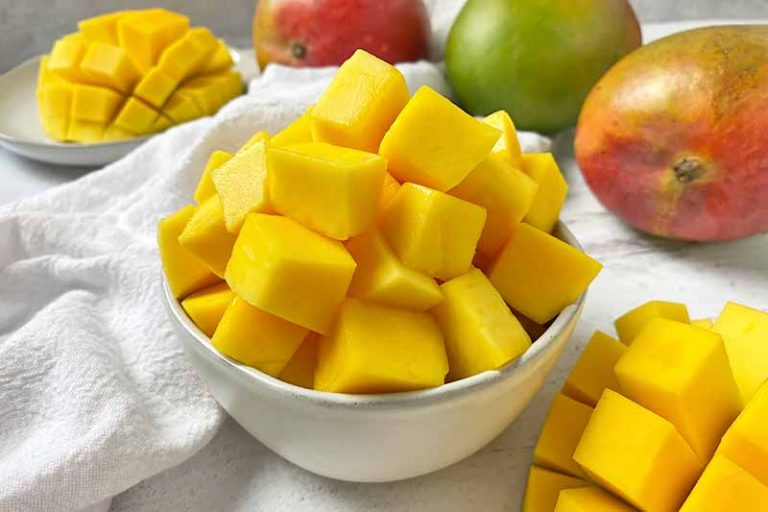

The mango (Mangifera indica) is a tropical fruit known for its vibrant flavor and fleshy texture. The fruit is typically oval or kidney-shaped and ranges in size, with a length of about 10 to 25 cm. Its outer skin can vary in color from green to yellow, red, or a mix of these hues. Beneath the skin lies the juicy, aromatic flesh, which can be yellow or orange, depending on the variety. At its core, a large, fibrous seed is embedded.
The mango tree itself is tall and evergreen, capable of reaching heights of up to 30 meters. Its leaves are long, slender, and glossy, while its flowers, small and white, form clusters before eventually turning into the fruit. Mango trees thrive in tropical and subtropical climates, with origins tracing back to South Asia.
Mangoes are not only a delicious treat but also offer numerous health benefits. They are packed with nutrients that promote overall well-being.
Mangoes are a great source of antioxidants, such as quercetin and mangiferin. These compounds help neutralize free radicals, reducing inflammation and potentially lowering the risk of chronic diseases like cancer.
Mangoes are loaded with vitamin C, which plays a crucial role in supporting the immune system, promoting collagen production, and improving skin health. The fruit also contains vitamin A, important for eye health.
Mangoes contain digestive enzymes like amylases, which help break down carbohydrates, making digestion smoother. Additionally, the high fiber content supports regular bowel movements and overall digestive health.
Mangoes can be enjoyed in various ways: fresh, in smoothies, as part of a fruit salad, or even in savory dishes like curries and chutneys. The versatility of the mango extends to its use in traditional beverages, such as the Indian lassi, a refreshing yogurt-based drink, or as a base for tropical cocktails and desserts.
Presentation
Weight per Bag: 2.5 kg
Bags per Box: 4
Boxes per pallet: 112
Pallets per Container: 20
Composition
Calories: 99
Fat: 0.6 g
Protein: 1.4 g
Carbs: 24.7 g
Fiber: 2.6 g
Vitamin C: 67%
Vitamin A: 10%
Folate: 18%
Vitamin E: 9%
Potassium: 6%
Uses:
Mango pulp can be used in smoothies, juices, and cocktails.
Mango chunks are often added to desserts, fruit salads, and yogurt.
It is used to create mango sauces, jams, and chutneys for savory dishes.
Mango is also a great ingredient for ice creams and baked goods.
Copyright © CAYMA